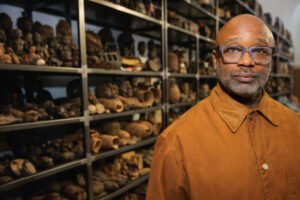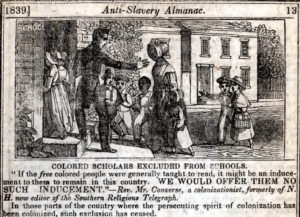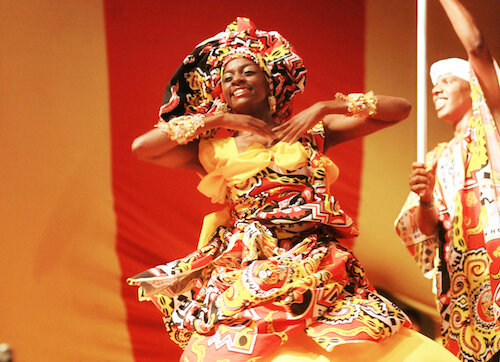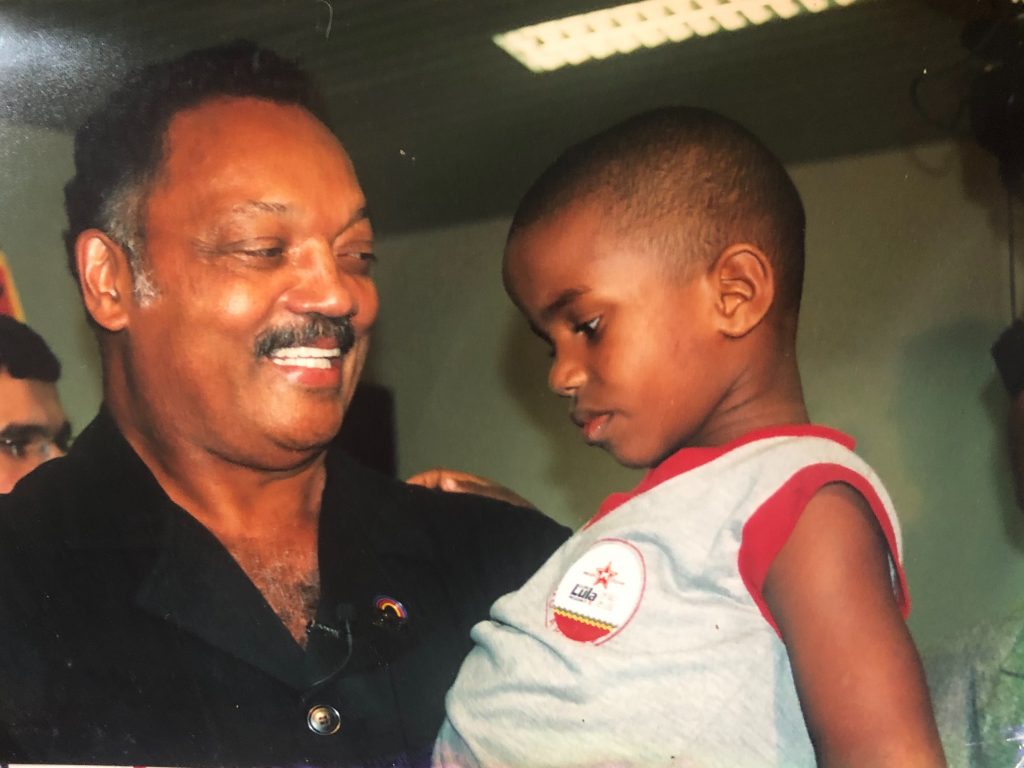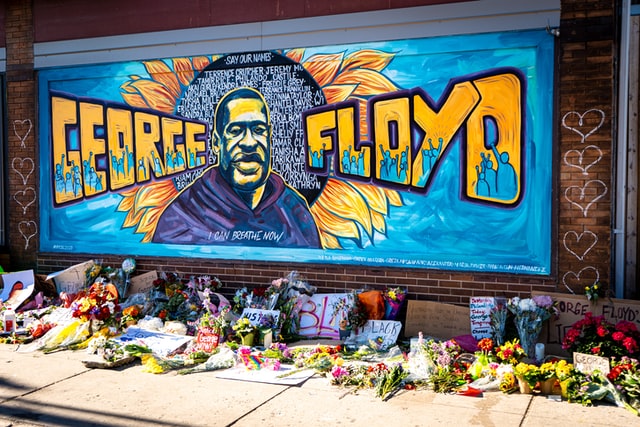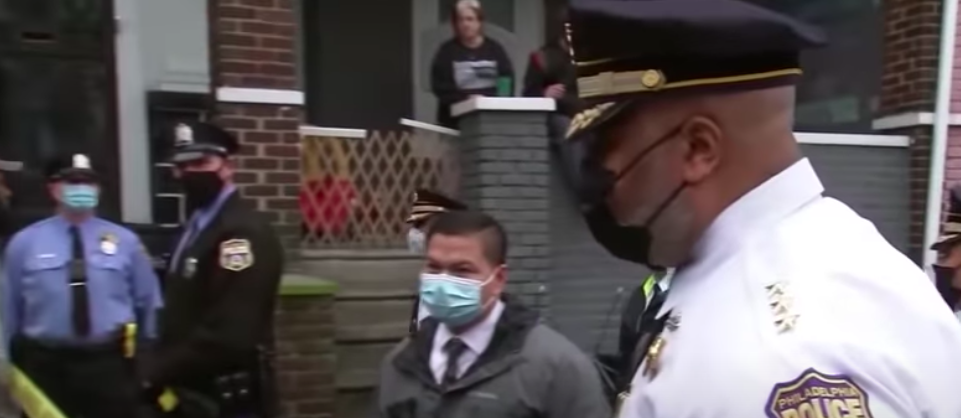This (in the picture above) is Lucimar Souza, the winner of the Ebony Goddess pageant in Salvador da Bahia, Brazil in 2011. “Deusa do Ébano” or the Ebony Goddess contest was created and hosted by a revolutionary musical organization named Ile Aiye (ILL-AYE , AH-YAE), from the Yoruba phrase meaning house (Ile) of life/spirit (Aiye).
Founded in 1974 during the height of the Brazilian dictatorship (1964-1985) by activists Antônio Carlos “Vovô” and Apolônio de Jesus, they resisted the racist segregation of Brazilian carnival by creating a Black-only carnival group or Afro Bloco. Originally called Poder Negro (Black Power), Ile Aiye helped guide the Brazilian Black Consciousness Movement by revolutionizing the Black presence in carnival.
I witnessed this while watching the Ebony Goddess greeting her court and the public at the headquarters of Ile Aiye. A two-story building atop a hill in a historic Black neighborhood called Liberdade (Freedom), where escaped and emancipated African descendants settled immediately following the abolition of slavery in 1888. Still one of the Blackest neighborhoods in Brazil, Liberdade was once often compared to Harlem, New York.
Not so much anymore.
On the large stage, she glided around, between, and on top of the winds booming up from the heavy drumline in the orchestra pit. In the iconic red, black, white, and gold Ile Aiye colors, she invoked the Orixas through movement. The audience responded by dancing to and singing the verses from the beloved Ebony Goddess ballad.
| My Ebony Goddess… I’ll sing for you That you are so beautiful In my house of life With your braids And so much originality Down the road, Full of happiness… | Ê, deusa do ébano Minha crioula Eu vou cantar para voce Que estás tão linda No meu bloco Ilê-Aiyê Com suas tranças Muita originilidade Pela avenida Cheia de felicidade |
The coronation spilled out in the streets. The drummers waded into a welcoming sea of neighborhood souls. We began marching down the hill deeper into the Liberdade neighborhood. Soon, I was standing in front of the simple studio apartment I’d been renting from the mother of a friend of another friend. Suddenly, the beat changed and the crowd went all the way up. I mean, the street trembled. Every single person began singing:
| Today earth is going to shake Volcano of Bahia is drum of Ilê Aye Wave stops on the stone Stone does not hold the sea Who holds the sea is a moon A delight for Iemanjá Liberdade is one neighborhood That the soul wants to visit Wash your mouth, clean your feet On the steps you take…. | Hoje a terra vai tremer Vulcão da Bahia é tambor do Ilê Aye Onda para na pedra Pedra não segura o mar Quem segura o mar é uma lua A delícia por Iemanjá Liberdade é um bairro Que a alma quer visitar Lave a boca, lave os pés Nas etapas que você dá…. |
There was an uncanny sense of pride beaming from each soul, grooving shoulder to shoulder, packed and radiating down the main avenue. The very same street in the very same neighborhood mentioned in the song. The words bursting from the chests in the row of Black souls in the back—would vibrate through you and cascade up the block like thunder.
I quickly scanned my memory to recall a song that everyone in my neighborhood could or would sing word-for-word like this. Not a pop song, but a rally cry about the history and strength of our people. Or one that tells the story of a sacred Black neighborhood or town. James Brown’s “Say It Loud!” came to mind, but I never heard “Say It Loud” sung this loudly in this way.
| We are carefree Negros (We are the coolest!) We have nappy hair (We are black power!) We are carefree Negros (We are the coolest!) We have nappy hair (We are black power!) What block is this? (Ilê) I want to know! (Ilê Aiyê) It’s the black world that we came to show you. What block is this? (Ilê) I want to know! (Ilê Aiyê) | Somos crioulo doido (Somos bem legal) Temos cabelo duro (Somos black power) Somos crioulo doido (Somos bem legal) Temos cabelo duro (Somos black power) Que bloco é esse? (Ilê) Eu quero saber (Ilê Aiyê) É o mundo negro que viemos mostrar pra você Que bloco é esse? (Ilê) Eu quero saber (Ilê Aiyê) É o mundo negro que viemos mostrar pra você |
There’s a great axiom from the team at The Hub when describing Black people: “The Global Majority.” This is a phrase that speaks for itself.
In that moment on the streets of Salvador, I felt Black in a way that I’d never known, but was veritably natural.
It was clear that Brazil is a poignant example of our global majority status, its history, and its potential. That night I slept like it was the first day in a brand new world.
Then the sun came up…
Two days later, I met up with a friend in the same neighborhood. As we waited outside of the Plano Inclinado (a trolley that transports workers from the upper city ghettos down the mountain into the tourist shopping district in the lower city), we watched as a city bus was pulled over by an SUV with military decals.
All the young Black men were ushered off the bus by the glowering centipede of military police with IA2 assault rifles trained at their chests. Within seconds, they were lined up and spread out against the side of the bus, covering the toothy grins of a now-expired billboard for a popular carnival samba group.

We watched as the young men and boys were each violated and either sent back on the street to walk to their destination or zipped-tied on the curb. As we began to descend down the mountain to shop for souvenirs, I could see three of the boys being stuffed inside the trunk of the SUV. The youngest could not have even been a teenager.
This wasn’t the first or the last horror I would see in Brazil.
Anthropologist and activist, Christen Smith calls the paradox of Brazil, “Afro-Paradise.” In her book of the same name, she analyzes the culture of Brazil as a metaphoric theatre of racial violence against its Black population.
“The popular, mythical image of Bahia is consumed globally but also in Brazil. Brazilians fantasize about taking a holiday in Bahia so that they can enjoy a happy Black place. But this celebrated tourism is staged against a backdrop of Black kids getting killed in the streets, Black people getting shot in their homes, people going to prison and never getting a trial. The state terrorizes its own citizens in order to create the fantasy of Bahia as a celebratory, romantic Black paradise: Afro-Paradise.” Dr. Christen Smith in SAPIENS MAGAZINE
Here are the facts.
Brazil has the largest population of Black people among all countries in the world with the exception of Nigeria.
Between 1501 and 1866, Portugal kidnapped and received approximately 5 million enslaved Africans compared to the 400,000 kidnapped and brought to North America.
Over half the population of Brazil identifies as Black* and in the state of Bahia, 83 percent of the population is Black. Despite being nearly an all-Black city and home of Ile Aiye, Salvador has never had a Black Mayor and the state of Bahia has never had a Black governor.
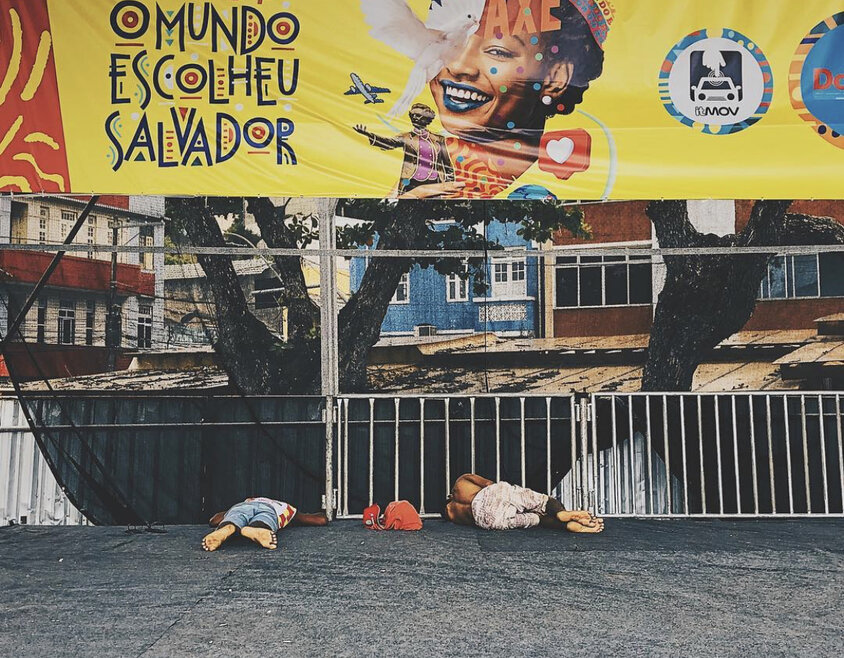
Blacks in Brazil represent 66% of homicide deaths compared to 29% of Whites. In the city of Rio de Janeiro alone, police have killed more than 9,000 people in the last decade with three-quarters of them being Black men. And in Sao Paulo, police kill one person every 7.5 hours. In 2008, a study showed that 111.2% more blacks died proportionally than whites. Higher illiteracy rates and higher unemployment result in a 46% higher average income for white Brazilians over Blacks.
Despite having a universal health care system, one study found that Black women are two and a half times more likely to die from an unsafe abortion than white women. Black women are 10-20 times more likely to die in childbirth. And the Brazilian government’s handling of Covid-19 represents negligence at genocidal levels and will likely surpass U.S. mortality rates before the pandemic ends.
If you don’t know, now you know.
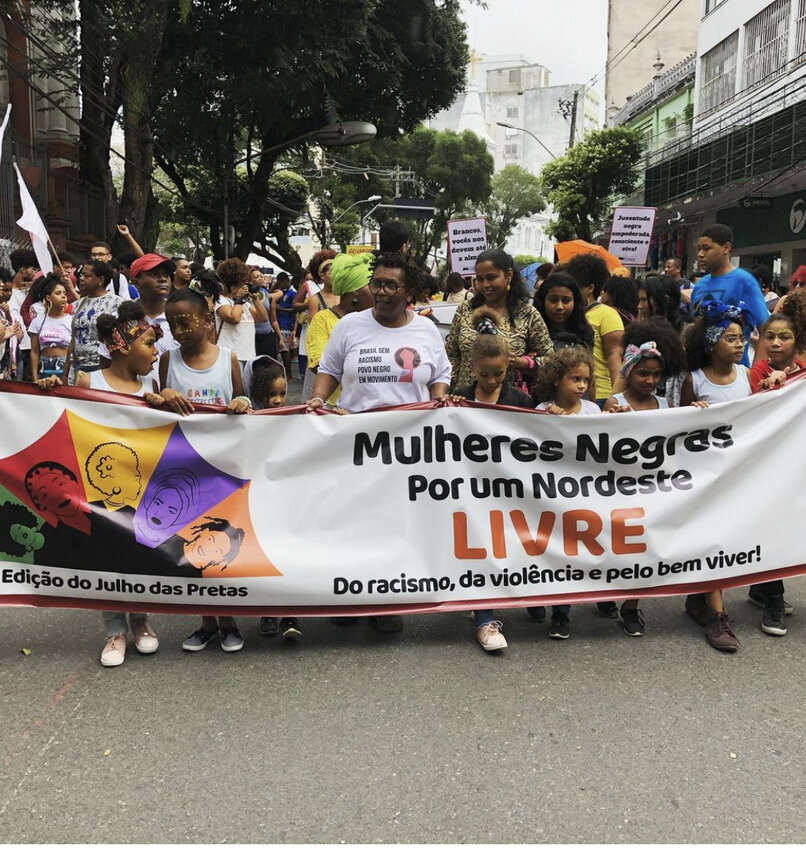
The curation of these images, memories and facts are a glimpse into my initiative, Atlantic Archives, a transnational, radical effort to uncover and preserve working-class dialogues and shared identities between Black people in the diaspora.
My comrades are working-class, Afro-Brazilian artists, activists and intellectuals who are fighting against Brazil’s systematic racial and class barriers with a Pan-African, intersectional pedagogy. Each week, I will be bringing you dispatches from our archives that will shed a light on the problems and solutions facing the Global South.
I’d like to thank The Hub for allowing me to share #atlanticarchives.
Our goal is to present a proper introduction to Black Brazil, sans the stereotypes and propaganda, free from the weight of capitalist cravings, straight to the heart of the matter—our collective Black future.
- * Today, there are three subcategories of Blackness in Brazil, based on skin color, facial, and hair features. Preto (Black) and Pardo (Brown or mixed-race) are the primary categories used by the federally. Negro is a socio-political category generally used by the Black activist community to refer to all African descendants. Brazilian citizens notoriously self-described their races on a 1976 census using over 100 “racial” categories (likely to avoid being classified as Black which is considered the lowest racial class. Some of these trifling epithets include: Azul-marinho: Sea blue, Branca-melada: Honey-colored white, Branca-morena: White but dark-skinned, Cafe-com-leite: Cafe au lait, Morena-roxa: Purplish brown, Pouco-morena: Not very dark, Queimada: Sunburnt, Sapecada: Singed, Tostada: Toasted


